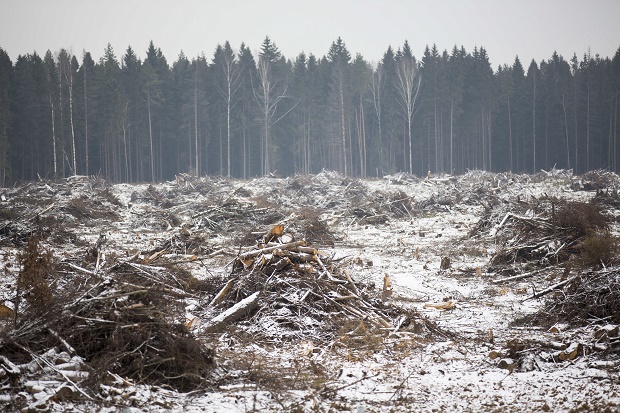
Trees are cut along a construction site of a new highway in Moscow region in this Nov. 17, 2015 photo. As the climate warms, moisture levels are changing with wet areas becoming wetter and dry areas drier. Russia is the fastest warming part of the world, according to a report from the country’s weather monitoring agency. The steady rise in temperatures puts Siberia- known for its long winters and lush forests- at risk to natural disasters, such forest fires. AP
PARIS, France — Global warming has triggered an array of apocalyptic scenarios for future generations, from worsening drought, storms and floods to melted ice sheets and rising seas.
Now a new study, published Tuesday and coinciding with the UN climate talks in Paris, adds to the grim tableau: the risk that warming at the far end of the scale could rob our planet of oxygen.
“We have identified another possible consequence of … global warming that can potentially be more dangerous than all others,” say a pair of scientists from Britain’s University of Leicester.
Their study, based in the peer-reviewed journal the Bulletin of Mathematical Biology, is based on a computer model of phytoplankton, the microscopic sea plants which produce about two-thirds of the oxygen in the atmosphere.
Average global warming of 6 C (10.8 degrees Fahrenheit) would be a threshold at which the phytoplankton’s vital oxygen-generating abilities, determined by water temperature, would be impaired, they say.
“It would mean oxygen depletion not only in the water but also in the air,” said the team. “Should it happen, it would obviously kill most of life on Earth.”
Warming of 6 C exceeds mainstream projections, although the International Energy Agency (IEA) has previously warned it is possible if nothing is done to reverse the rise of greenhouse-gas emissions.
Many scientists say that if this temperature is ever reached, it could result from unbridled carbon emissions over a very long period — or from a tipping point such as the release of methane gas from melting permafrost, which would cause warming to accelerate at a stroke.
UN members negotiating a climate rescue pact in Le Bourget have embraced a goal of limiting global warming to 2 C over pre-Industrial Revolution levels, or less. Last month, Britain’s weather office said 2015 was on track to hit the halfway, 1 C, mark.
The UN’s climate science panel, considered the authority on the subject, has said the globe could become 4.8 C warmer this century on worst-case-scenario greenhouse gas emission trends.
“The message from this study is that there may be another disaster approaching us as a consequence of global warming, and it may be much worse than all other consequences identified previously,” co-author Sergei Petrovskii told AFP.
“There may be very little warning signs before the disaster actually happens… but once the critical threshold is passed (as estimated at 6 C), then the catastrophe will develop fast,” he explained by email.
The team said research into the effects of warming on oceans so far had focused on sea level rise and species loss.
Their study was based on mathematical modelling, rather than observational research, and the authors acknowledged they did not factor in certain natural processes, such as ocean circulation, which could influence the outcome.
But, they said, if carbon emissions remain unchecked, deoxygenation is ultimately not a risk to be dismissed.
“The danger… is probably more real than to be drowned,” they wrote.